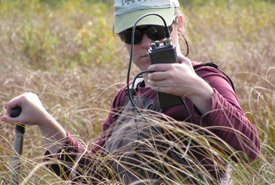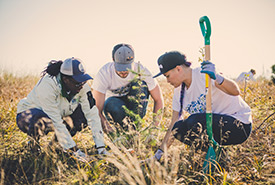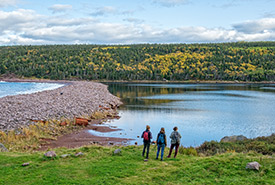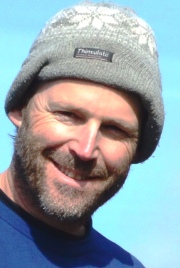World Conservation Day 2020: What is a conservancy and why does the word matter?

Conservation Volunteers, Crowsnest Pass, Alberta (Photo by NCC)
The word “conservancy” can be a mouthful. Even after 17 years at the Nature Conservancy of Canada (NCC), I sometimes feel like I have marbles in my mouth as the word leaves my lips. I say the words “nature” and “Canada” all the time. But conservancy is generally reserved for when I talk about my work.
All of us who are lucky enough be part of NCC hear regular permutations and pronunciations of our organization’s name. I don’t even blink anymore when I hear Nature “Conservatory” of Canada. As the Nature Conservancy of Canada, we of course want people to get our name right. And the more I’ve learned about the word conservancy, the more I think it’s critical that we do.

Caroline Gagne, Ottawa Valley project manager, doing telemetry research, Quebec (Photo by NCC)
At NCC, we’ve been using “conservancy” for almost 60 years to describe our work. And there are a growing number of conservancies in Canada. Where I Iive in Ontario, there’s the Muskoka Conservancy and Bruce Trail Conservancy. In BC, conservancy is used to designate Crown lands that have been set aside to protect Indigenous values, while still permitting recreational use and limited resource development.
Although conservancy is not an everyday word for most people, it has a deep meaning. And perhaps this meaning is more important and relevant now than ever before.
Conservancy is, not surprisingly, a derivative of conserve. Dig deeper into its roots and you’ll find the Latin word conservare. Now this is where it gets more interesting. Conservare is rooted in two smaller words.

Conservation Volunteers planting trees at Swishwash Island, BC (Photo by NCC)
Con is Latin for “bringing together.” Conversation or concurrent are two examples of this prefix.
Servare is another word with Latin origins, but its roots probably go back thousands of years ago to the ancient common ancestor of all Indo-European languages. Servare means “to keep” or “to watch over.”
Somewhere along the way, ancy was added. This suffix refers to the quality or action of something — like the relevancy (or irrelevancy) of what you’re reading right now.

Hikers at Freshwater Bay, NL (Photo by Dennis Minty)
The first use of conservancy may have been in the UK in the 1600s to describe how rivers needed to be managed in a more coordinated fashion. Conservancies were formed to manage the use of these rivers. The term conservancy was then later applied to describe the management of other natural resources, such as fish and forests, and even cultural resources.
So, what is a nature conservancy? It’s a group of people working together to watch over nature.
There has never been a more important time for us all to work together for nature. We are all living through a period of rapid global change as the result of human activities. Carbon pollution in our air and oceans have been pushed to new limits. Up to a million species are threatened with extinction in the coming decades. Important habitats are continuing to be lost.
No agency or sector can solve this crisis alone. The Nature Conservancy of Canada can’t protect every endangered species. Government policy alone can’t solve habitat loss. No single corporation can change our course on the climate crisis. These are complex problems that need us all to work together to find a solution.
But what we conserve impacts much more than nature.
What we choose to save and what we choose to lose impacts who we are. The places we create impact who we are, and who we will be.
We are coming to a profound realization that our well-being rests on a foundation of nature. Our health is the health of nature — the future of nature is our future. Nature is wildlife and habitats, but it is also air, water, culture and identity. Of course, this is not new knowledge. It’s an ancient truth that all human societies once knew and has been kept by Indigenous cultures that have survived.
Conservation is much more that what we all do to our land, waters and wildlife, but what nature does to us. Being a conservancy is not just us watching over nature together. It’s ensuring that nature can continue to watch over all of us.


